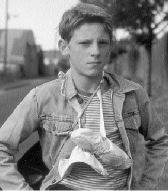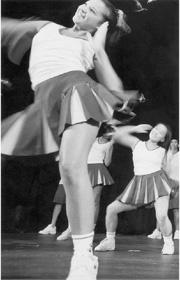AS A FEEL-GOOD tale about a motherless youth-with-no-opportunities who triumphs by bucking gender expectations, Stephen Daldry’s debut feature falls short of very similar, recently released Girlfight. In the latter film, teenage barrio girl becomes a champion boxer. In Billy, set in a strike-afflicted northern England mining town in 1984, an 11-year-old boy takes up ballet. The story may be predictable, but unlike so many flicks that wear thin by the second half, Billy actually grows on you, its characters becoming more engaging as the movie goes along. Most genuine is the father-son relationship played out respectively by Gary Lewis and Jamie Bell.
BILLY ELLIOT
directed by Stephen Daldry with Julie Walters, Gary Lewis, and Jamie Bell opens October 20 at Guild 45th
Like Girlfight‘s Diana, Billy must deal with considerable gender bias. His tough-fisted father and brother characterize male dancers as “puffs” and their flagrant objection to Billy wearing toe shoes parallels their denigration of the scabs who cross the picket line. (Billy dances in secret, pretending to go to boxing class instead—supply your own comparisons to Rocky here.)
As his fleshy, chain-smoking dance teacher, Educating Rita‘s Julie Walters provides an amusing contrast to the stereotypical image of the refined ballerina. While Billy’s dad is gray and icy, Walters is colorful and heated. Acting as Billy’s surrogate mother, she introduces a life-changing opportunity to the boy: an audition for the Royal Academy Ballet School in London.
Yet, in the end, Billy Elliot isn’t really a dance film. Instead, the father-son dynamics and Lewis’ moving performance as the rough-hewn collier who eventually has to confront his boy’s determined wishes anchor this pleasing, worthwhile picture. (Some may recall Lewis as the insanely bereaved coffin-carrying eldest brother in Orphans and from My Name is Joe.) This parent eventually comes to realize that Billy isn’t just turning pirouettes, but that the lad stands to enter a big, unfamiliar, yet probably better world—which any good father is ultimately bound to support.







